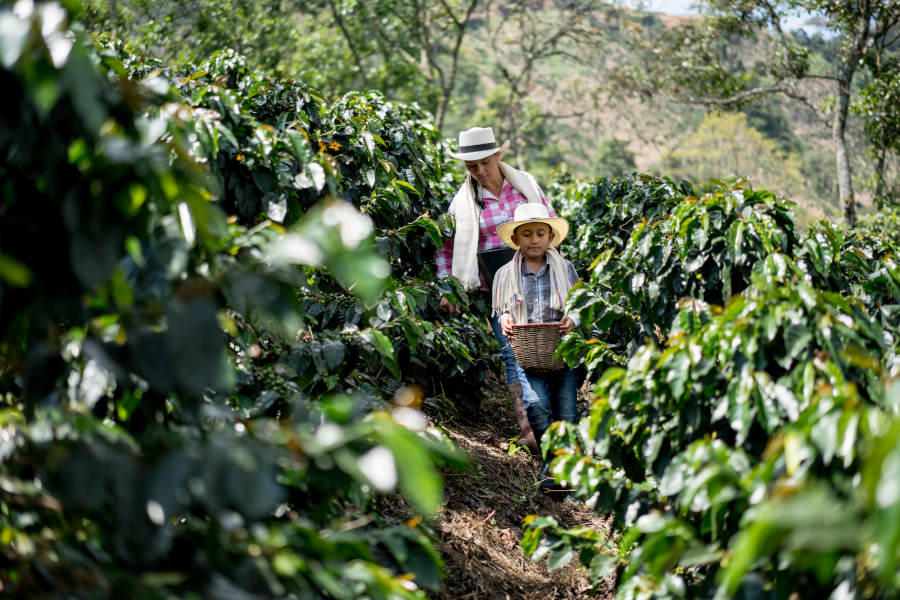Fair Trade Month
Founded more than 25 years ago, Fairtrade was an initiative established after the global collapse in world coffee prices. This crisis left smallholder farmer devastated, with their earnings amounting to less than the cost of growing their coffee.
In response to this hardship, concerned consumers and businesses (including Oxfam, The Women’s Institute, CAFOD, Christian Aid, and Traidcraft) banded together to form a social movement, aiming to raise awareness of unfair trade and help establish a market for moral purchasing. Fast forward to 2020 and The Fairtrade Foundation now has over 6,000 certified products on shelves; from coffee to chocolate – even clothing and cosmetics, the organisation has transformed the way in which many shoppers view brands.

Food
Co-op was the first UK supermarket to sell Fairtrade bananas in all its stores. Today, all of its bananas, chocolate, sugar, tea, flowers and wine are Fairtrade. In recent years, the supermarket has drawn attention to its association with the organisation in multiple advertising campaigns.
Greggs have been associated with Fairtrade for 13 years – working closely with their coffee suppliers; enabling farmers to invest in improving the quality of the beans, thereby producing great tasting beverages. In 2016, the high street favourite made their biggest commitment to the charity, offering customers Fairtrade bananas and teas as part of its widening product focus.
The same year, the Greggs team visited Peru and interviewed farmers for a film which has been used to connect their customers and staff to Fairtrade coffee farmers. Most recently Greggs has supported the annual Fairtrade Fortnight campaign and the newly launched Fairtrade Friday digital initiatives, by telling its customers about the difference they make every time they buy a coffee, banana or cuppa as part of their “Proud to be Fairtrade” campaign.
Fashion
Fairtrade has been working with cotton farmers since 2010 – enabling them to sell their goods at a decent price so they can provide for themselves and their families. It also requires that the factories that process Fairtrade cotton comply with ILO (International Labour Organization) core conventions.
Established in 1991, People Tree is one of the pioneers of Fairtrade fashion. Through their close partnerships, the retailer works to the highest standards on projects to support their producers – including hand skills training, the development of natural and low-impact dyes as well as organic cotton farming. With new on-trend designs and vegan-friendly products, the brand has successfully proven that even in the fast-moving, extremely volatile fashion and garment industry – fair trade can succeed.
The White Stuff are another popular retailer notable for their ethical sourcing. In 2018 they became the only British lifestyle brand to sign a three-year commitment to increase the amount of Fairtrade Cotton that they source, helping to ensure their products feel good and do good.

Brands that care
“For tea and coffee, and in fast-food it’s become quite important. It’s important for the consumer to see they’ve got an ethical option.”
Chris Arnold, Creative Director, Creative Orchestra
Formally limited to the diction of your stereotypical tie-dye-wearing hippy – the terms ‘sustainability’ and ‘ethics’ are now commonplace in the everyday vocabulary of the besuited marketer. In recent years, the Corporate Social Responsibility (CSR) has risen on the agenda for many businesses, as industry professionals are realising that it is good practice for companies to respond to the social and environmental concerns within their market.
The Fairtrade mark offers very simple cut-through and additional assurance for people buying brands that they are getting independent verification that they are buying an ethical product. Huge businesses aren’t embracing Fairtrade because it feels good – they recognise that their customers care about responsible sourcing and sustainable business practices. In other words; it’s good for business.
Constantly evolving digital technology has presented new social avenues for companies looking to establish their brand’s synonymity with ethicality. In an online realm distinguished by the “naming and shaming” of company’s corporate practices for not conforming to their social and environmental visions; a principled business can foster a dialogue with their demographic via social media and gain consumer respect. At Cordis, we recognise that creativity is the key to successful communication – by employing our expertise in social media, copywriting, design, events and videography; we can successfully manage your desired customer relationship.